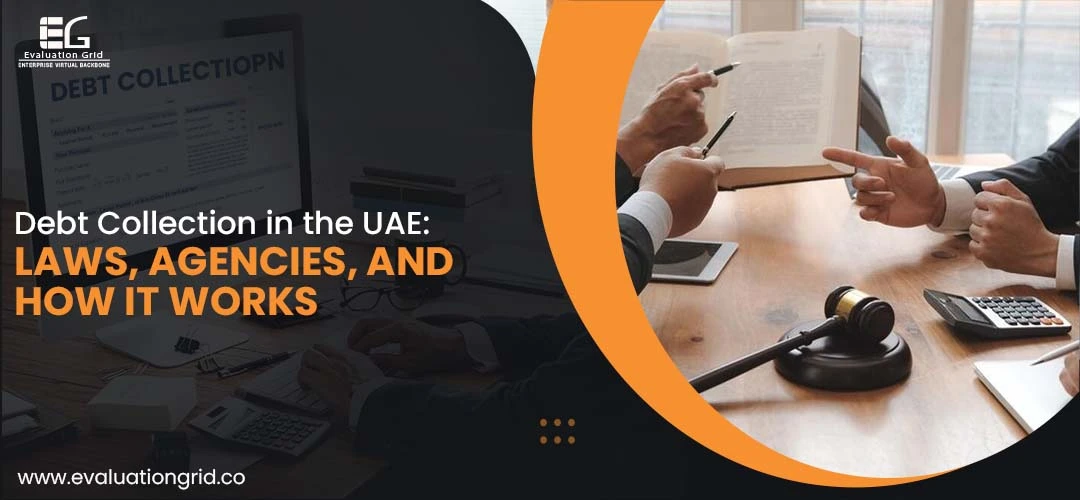Financial transactions in a worldwide corporate hub such as the UAE are quick-paced and sometimes complicated. While many trades go through without any problems, some experience delays or defaults that result in the growing demand for debt collecting services. Knowing how Debt Collection in the UAE operates is essential regardless of your company, personal, startup, or global.
Especially in major locations like Dubai, this thorough guide will lead you through how debt collection UAE works — covering collection laws, the role of agencies, and the full process.
What is Debt Collection?
The process of seeking payments of debts owing by people or companies is known as debt collecting. This method guarantees creditors in the United Arab Emirates recover what is due to them, either by means of negotiation, settlement, or legal action, therefore ensuring their rights.
Debt collection comes mostly in two flavors:
- Amicable, or out-of-court, is a non-confrontational method whereby collection companies get in touch with the debtor and discuss terms of repayment.
- Legal debt collection calls for judicial processes, legal notices, and sometimes asset seizure.
Debt Collection UAE: An Overview
The UAE has developed a debt recovery organized ecosystem. From debt collection companies and registered collection agencies in Dubai, to rigorous collection agency laws, every component of the system is meant to guarantee equity and effectiveness.
Why it’s important:
- One important market for worldwide trade is the United Arab Emirates.
- It draws small firms, freelancers, and foreign investors as well.
- Many deals are based on credit, which increases the possibility of unpaid debt.
If you’re looking for a trusted agency to support your recovery needs, explore our debt collection UAE services tailored for businesses and individuals across the Emirates.
Understanding Debt Collection Laws in the UAE
Civil, commercial, and penal legislation together control debt collection rules in the United Arab Emirates. Although Sharia rules form the foundation of UAE legal system, it also incorporates French and Egyptian legal traditions’ civil law aspects. Main Legal Aspects:
1. Civil Transactions Law, Federal Law No. 5 of 1985
This controls contractual rights. Under civil law, the creditor has the right to reclaim should a debtor neglect to pay back.
2. Penal Code ( Federal Law No. 3 of 1987 )
Writing a bouncing cheque used to be seen as a criminal act. Minor bounced check instances have been decriminalized following 2020 changes, though, and now more often find their place in the civil sphere.
3. Commercial Transactions Legal Framework
Applied in situations involving commercial debt conflicts, this offers a more comprehensive structure for credit recovery and corporate responsibilities.
4. Laws concerning Collection Agencies
Legal debt recovery in the UAE is only pursued by licenced debt collection agencies. Unlicensed activities could be subject to fines and closures among other harsh punishments.
Note: Strongly forbidden are unethical behavior and debt harassment. Authorities can be notified of any debt collection agency that acts aggressively or aberrally.
How Does Debt Collection Work in Dubai and Across UAE?
Whether you’re using a debt collection agency in Dubai or hiring legal counsel, the process generally follows these stages:
Stage 1: Internal Follow-Up
Before involving a third party, the creditor typically tries to recover the debt internally via:
- Reminder emails
- Phone calls
- Payment notices
If there’s no response after repeated attempts, it’s time to engage professionals.
Stage 2: Hiring a Debt Collection Agency
A collection agency in Dubai or elsewhere in the UAE acts as a mediator between debtor and creditor. They follow a step-by-step approach:
- Contacting the debtor through formal channels
- Proposing settlement terms
- Setting repayment schedules
- Avoiding litigation when possible
Most debt recovery companies operate on a “No Win, No Fee” basis, meaning they only charge a percentage if recovery is successful.
Stage 3: Legal Debt Collection
If the amicable approach fails, creditors can pursue legal debt collection by:
- Filing a case in the UAE Civil Court.
- Presenting contracts, invoices, and other documentation.
- Enforcing court judgments via asset seizure or travel bans.
Debt recovery UAE laws allow courts to:
- Freeze bank accounts
- Ban international travel
- Confiscate passports (in exceptional cases)
However, these are considered last resorts. Courts usually prefer debt settlement and mediation.
How to Choose a Debt Collection Agency in the UAE
With many debt collection firms available, it’s crucial to choose the right one. Here’s what to consider:
1. Licensing & Registration
Always ensure the agency is licensed to operate under UAE law. Unregistered firms are illegal.
2. Experience in Local Laws
Agencies with strong knowledge of debt collection laws and regional languages are more effective negotiators.
3. Reputation & Track Record
Check online reviews, testimonials, and case studies.
4. Fee Structure
Some agencies offer:
- Fixed fees
- Commission-based charges
- Hybrid models
Choose the one that aligns with your budget and risk level.
5. Specialization
Some agencies specialize in:
- Debt collection Dubai market
- International recoveries
- Corporate B2B debt
- SME or individual claims
Challenges in Debt Collection UAE
While the UAE has robust laws, there are still some challenges:
- Language barriers (Arabic is the official court language)
- Reluctance to litigate due to legal costs
- Debtors fleeing the country
- Lack of updated contact info
- Delays in civil court proceedings
That’s why hiring a debt collection agency in Dubai or elsewhere is highly recommended, they navigate these challenges daily.
Tips to Prevent Debt Collection Issues
Prevention is always better than collection. Here’s how businesses and individuals can protect themselves:
1. Conduct Thorough Credit Checks
Before extending credit to any client, especially for large amounts or long-term engagements, it’s essential to evaluate their financial history.
In the UAE, many debt collection agencies and financial advisors offer credit vetting services as part of their consultation packages. Taking this simple step can prevent major financial headaches in the future.
2. Draft Clear and Legally Binding Contracts
One of the most common reasons for delayed payments is ambiguity in agreements. To avoid future disputes, your contracts should be watertight.
Always have your contracts reviewed by a legal expert who understands debt collection laws in the UAE. This will ensure your rights are protected in case of a dispute.
3. Utilize Post-Dated Cheques as Security
While cash payments and bank transfers are common, many businesses in the UAE still rely on post-dated cheques (PDCs) as a form of security for future payments.
Though minor bounced cheque offenses have been decriminalized, they still carry civil implications and can be used effectively in the legal debt collection process. Just ensure you handle PDCs in compliance with UAE banking regulations.
4. Maintain Accurate and Organized Documentation
In any debt dispute, the creditor’s biggest asset is proof. The more documented evidence you have, the easier it is to recover your dues.
When working with a debt collection agency in Dubai or anywhere in the UAE, these documents become crucial for building a strong recovery case, whether through negotiation or litigation. Use cloud-based accounting and CRM tools to keep your documentation organized and easily accessible.
5. Follow Up Consistently and Professionally
Delayed payments are often the result of poor follow-up rather than bad intent. However, if ignored, they can turn into long-term defaults.
Don’t wait until the debt becomes unmanageable. If payment hasn’t been made within a reasonable time frame (30–60 days), consider involving a debt collection firm. The earlier the recovery process begins, the higher the chances of success.
6. Be Ready to Take Legal Action (When Needed)
Despite all preventive measures, some clients may still default. In such cases, don’t hesitate to consult a legal advisor or a trusted debt collection agency. Delaying legal action can result in lost time, expired claims, and the debtor fleeing the country.
But when push comes to shove, being prepared to escalate can significantly improve your chances of recovery.
If you’re dealing with delayed payments or legal disputes, working with a trusted debt collection agency in Dubai can help recover dues efficiently and within legal boundaries.
Final Thoughts
Debt Collection UAE services have become indispensable in today’s commercial environment. Thanks to structured debt collection laws, a growing number of debt collection companies, and the availability of legal and amicable options, creditors can now recover dues with confidence.
When assessing service providers, it’s crucial to consider how well they comply with debt collection legislation and current debt collection agency laws in the UAE. A trustworthy partner should operate transparently, within legal boundaries, and maintain ethical recovery practices. If you’re searching for a reliable collection agency near me, our evaluation grid can help you compare key players based on legal compliance, recovery success, and reputation. Whether you’re in Dubai, Abu Dhabi, or elsewhere in the Emirates, the right approach and the right debt collection agency can make all the difference.






